Learner Voice Training
AONTAS offer Learner Voice Training to staff in Education and Training Boards across the country
This project is funded through the New European Agenda for Adult Learning (NEAAL)
Funded by the European Union. Views and opinions expressed are however those of the author(s) only and do not necessarily reflect those of the European Union or the European Education and Culture Executive Agency (EACEA). Neither the European Union nor the granting authority can be held responsible for them.

Learner Voice is a concept based on the idea that learning should be guided by both learners and teachers.
The goal of Learner Voice activities is to listen and respond to what learners need, which will facilitate more learners returning to and staying in Further Education and Training.
Learner Voice has always been and remains at the heart of AONTAS’ work, as we strive towards our vision of educational equality for all adult learners.
Since 2020, we’ve been working with staff and learners in Education and Training Boards (ETBs) across Ireland to develop Learner Voice as a process that is embedded in Further Education and Training (FET).
We provide training for staff focused on the principles and implementation of Learner Voice work.
What’s new with our Learner Voice Training?
As Ireland’s National Coordinator for the New European Agenda for Adult Learning (NEAAL), we are expanding our Learner Voice Training opportunities in 2025. We are focusing on developing, piloting, and evaluating this training for staff in eight ETBs.
The training includes:
- Theory behind Learner Voice
- Discussion with other staff
- Practical tools and resources needed to establish sustainable Learner Voice structures
The training will be particularly useful for staff planning to establish a Learner/Student Council in your ETB over the coming year. Training can be customised to meet the needs of the ETB and typically lasts for 3 hours, including a break.
The training is open to anyone who works directly with learners, centre managers and ETB staff who have a particular responsibility for Learner Development or who work with us at AONTAS on the delivery of the National FET Learner Forum.
We will develop and evaluate our Learner Voice Training and invite the participating ETBs to share its impact with us.
AONTAS also offers workshops for learners on Learner Voice, leadership, and committee skills. Learner Voice Staff Training Information Sheet
If you work for or with an ETB and would like to learn more about this training, contact Ruby at rcooney@aontas.com
This training is part of the New European Agenda for Adult Learning (NEAAL)
Funded by the European Union. Views and opinions expressed are however those of the author(s) only and do not necessarily reflect those of the European Union or the European Education and Culture Executive Agency (EACEA). Neither the European Union nor the granting authority can be held responsible for them
Learner Voice Resources
This Learners as Leaders handbook is a free resource to complement our ongoing Learner Voice Training. It provides ETB staff with the theory, tools, and practical resources to facilitate learners’ sharing of feedback and learning experiences at their ETB.
The goal is to help make learning better for everyone.
2025 - Learner Voice Training
June 2025: Limerick and Clare Education and Training Board staff
In June, our Learner Voice Project Officer, Karyn Farrell and Education Projects Officer, Ruby Cooney, led a Learner Voice training session for 14 staff members from Limerick and Clare Education and Training Board (LCETB).
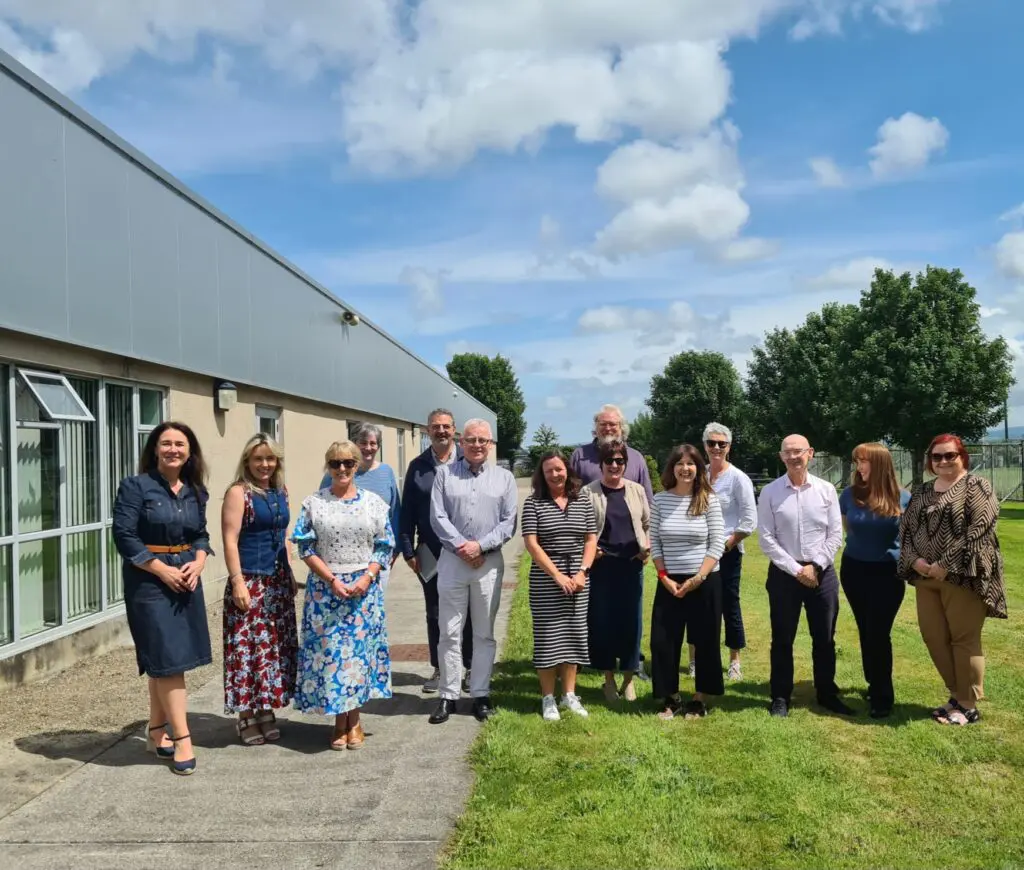
LCETB want to develop a culture of meaningful learner engagement and work towards creating more genuine partnership mechanisms. The session involved recognising effective Learner Voice practices in LCETB and identifying areas for improvement. During the session, staff discussed the essential steps to establish a Learner Voice structure suitable for LCETB.
When asked in the end-of-session feedback form to share their highlight of the session, participants said the opportunities to discuss challenges and possibilities with peers.
May 2025: Galway and Roscommon Education and Training Board staff
- The broad extent of ideas to engage with the learner voice
- Opportunity to share and learn about other centre practices
- The start of putting together a learner voice structure within the organisation
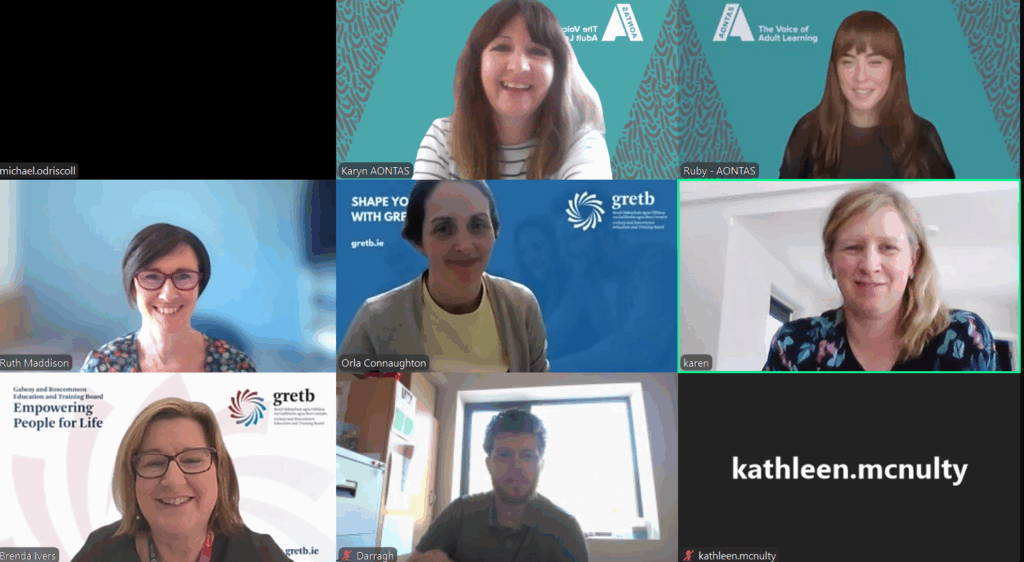
May 2025: Kerry Education and Training Board staff
- Inclusion
- Respect
- Equality
- Quality
- Excellence in Learning
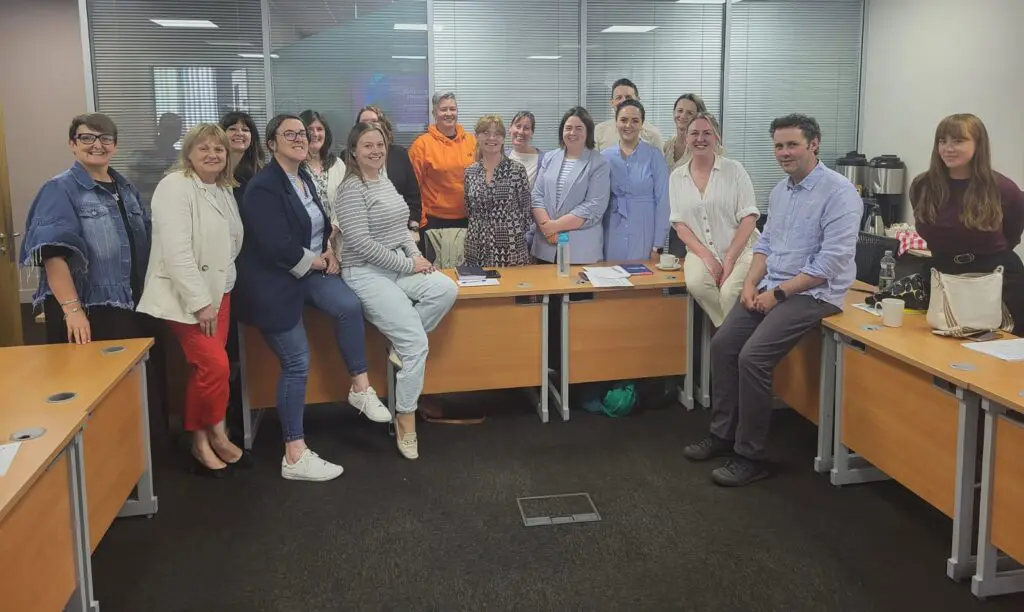
February 2025: Cavan and Monaghan Education and Training Board
In February, Karyn and Ruby delivered Learner Voice training to staff members from Cavan and Monaghan ETB. Attending staff included teachers, an assistant principal, learner support staff, and Youthreach resource workers.
During the session, staff noted barriers to Learner Voice implementation, including lengthy surveys hindering detailed responses. They also proposed solutions like releasing learners for participation and adopting various mixed methods.
After the session, the staff members were asked to share their highlights. Below are some answers provided.
- Collaborating with members from other sectors in CMETB and sharing of stories of best practices in Ireland
- Engagement and involvement and examples from ETBs
- Practical Implementation Strategies
- Learning about the work of the students union in Monaghan institute and the Journey podcast
January 2025: Louth and Meath Education and Training Board
In January, Ruby, our Education Projects Officer, and Megan, our Head of Impact and Engagement, facilitated a Learner Voice Training session for seven staff from Louth and Meath Education and Training Board.
The session was the first of the 2025 and aimed towards introducing Learner Voice theory and its practical application in the everyday work of LMETB staff.
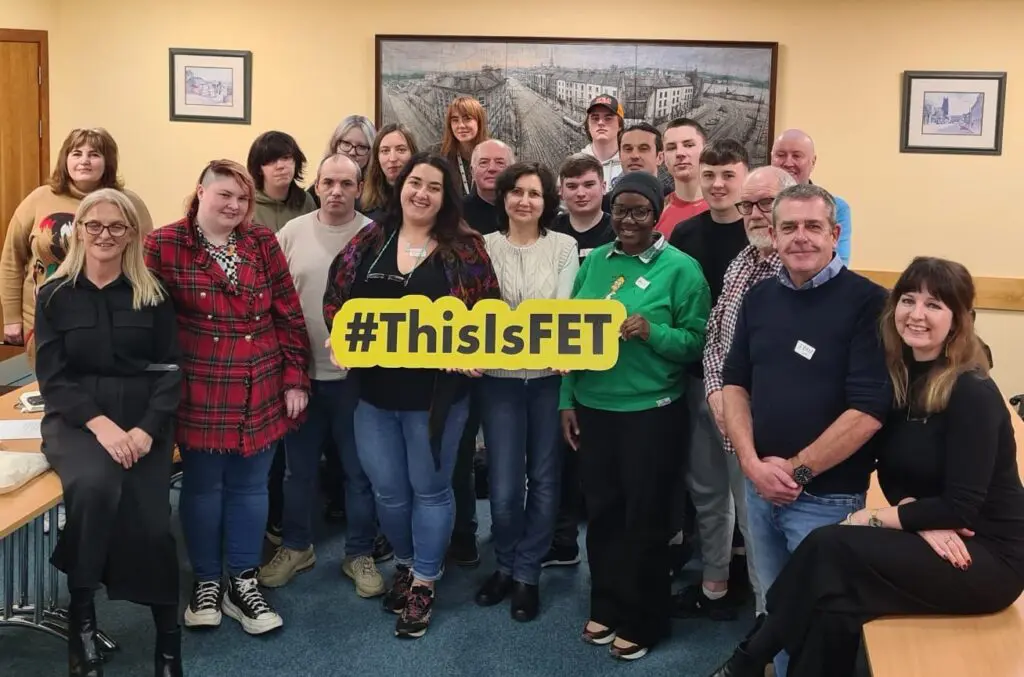
December 2024: Waterford and Wexford Education and Training Board
Karyn and Ruby facilitated a Learner Voice training session with 25 learners from Waterford and Wexford Education and Training Board. The group was a mix of learners who have previously been involved in WWETB’s Learner Council, and new learners who are interested in joining next year. The session had a practical focus on Committee Skills and had two clear aims for participants:
- To develop a clearer understanding of how an efficient Learner Council functions
- To equip learners with the practical knowledge, tools and resources to run their own Learner Council meetings
The session was a mix of theory and interactive group exercises. Learners had the opportunity to explore the different kinds of decision-making processes, and to identify and understand the different Learner Council roles and responsibilities.
When asked in the end-of-session feedback form, all participants noted that they now had a clearer understanding of how an efficient Learner Council functions. Learners said they liked the “active listening and the friendly atmosphere”, “listening to other people’s experiences”, “learning about the different roles in a meeting” and the group exercises.
A follow-up session will take place in February where participants will have the opportunity to put their learning into action.
September 2024: Waterford and Wexford Education and Training Board
Ruby and Karyn facilitated a Learner Voice training session with 12 staff members and tutors from Waterford and Wexford Education and Training Board.
The session was conducted online via Zoom, using a range of interactive methods to engage with participants.
Learning outcomes for participants were:
- Building a greater understanding of Learner Voice as a process and a culture
- Identifying opportunities to listen to and involve learners more in their educational experience
- Using a planning framework to build a sustainable and meaningful Learner Voice structure
One staff member noted that they enjoyed “hearing what’s happening elsewhere and finding out how to get my learners’ opinions heard on a local basis.”
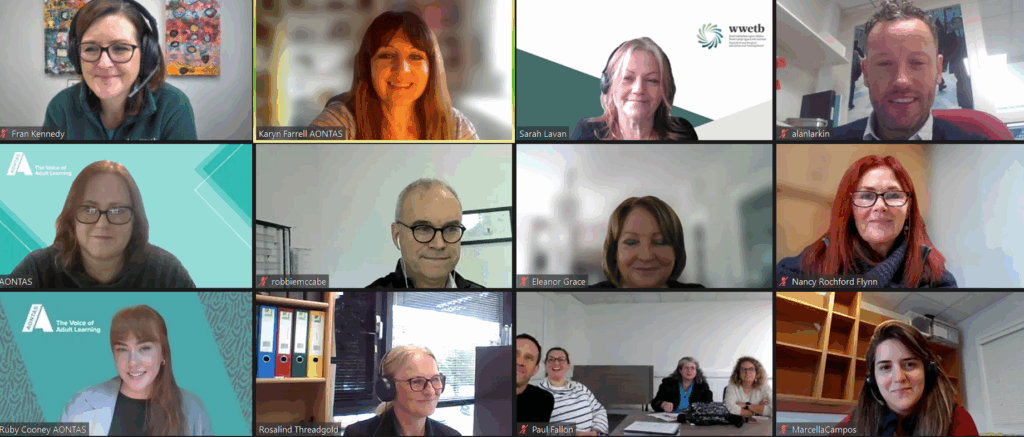
September 2024: Dublin and Dun Laoghaire Education and Training Board
Ruby and Karyn facilitated a Learner Voice training session with 5 staff members from the Quality Assurance Unit with Dublin and Dun Laoghaire Education and Training Board.
The session had two main aims:
- To give an introduction to Learner Voice theory and its practical application
- To equip staff with the practical tools and resources necessary to set up sustainable Learner Voice structures
The training incorporated a broad range of interactive and practical methods. One of these included a Mind Map exercise for staff to collaborate on putting a sustainable framework in place to support a functioning and meaningful Learner Voices group.
One staff member said: “The session focused our attention on where to start and gave us a structure and framework to ensure organisational consistency.”
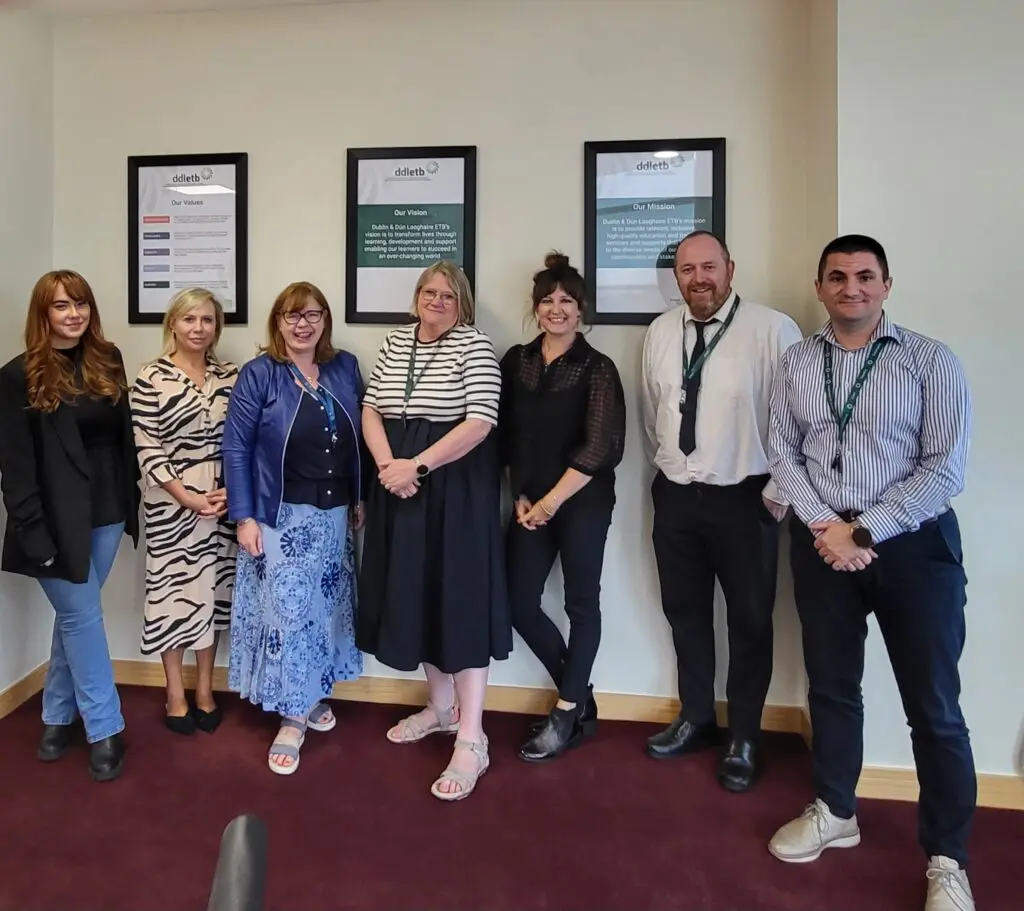
June 2024: City of Dublin Education and Training Board
Karyn and Ruby facilitated a Learner Voice training session with 14 staff members from City of Dublin ETB Educational Service to Prisons. Participating staff included teachers and head teachers with representatives from all seven Dublin prisons and Pathways. The session had two broad aims:
- To give an introduction to Learner Voice, and what’s happening to capture the learner experience across the ETB sector
- To share learning across Prison Education centres and Pathways about practical tools and resources to engage in different Learner Voice activities
Participants worked together to identify opportunities to listen to and involve learners more in their educational experience. They shared valuable insights into initiatives and programmes that are working well in their individual centres, and came up with new ways to increase the visibility of these activities.
They also discussed solutions to overcoming some of the barriers and challenges they face while working on Learner Voice activities in a restricted setting. They collaborated on ways to put more formal structures in place to capture learners’ views and feedback.
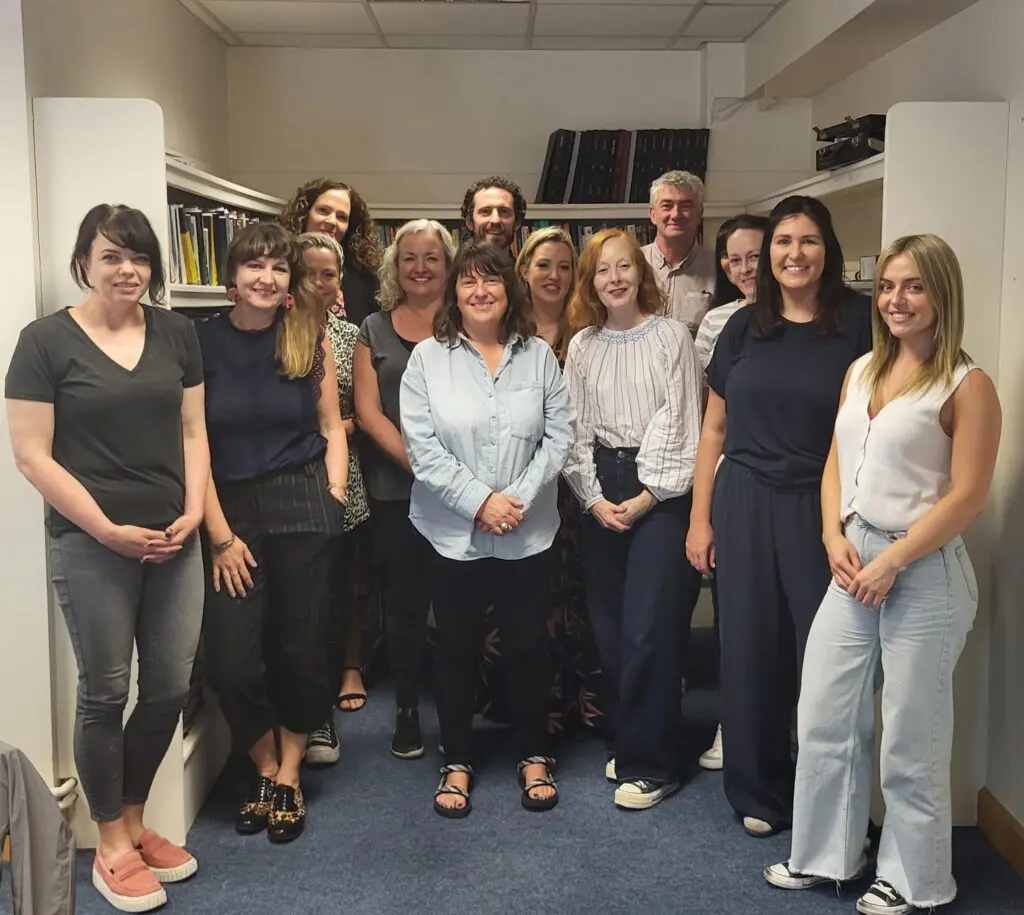
June 2024: Galway and Roscommon Education and Training Board
Ruby and Karyn facilitated a productive and engaging session with four staff from Galway and Roscommon Education and Training Board at the dedicated GRETB training centre in Mervue.
Meaningful Learner Voice engagement is a passion project of Quality Assurance Coordinator Marion O’Regan.
With a plan to establish a representative Learner Voice group for the GRETB region in Autumn, she wanted to ensure that all structures and resources were in place from an ETB perspective before the recruitment of learners commenced.
This is an example of good practice in action – having an embedded support system in place will ensure that the process is not tokenistic and will be sustainable.
The session involved an introduction to Learner Voice theory and its practical application in their everyday work. It also highlighted some of the practical tools and resources necessary for them to set up a Learner Voice group. The group then worked together as a team to identify their priority actions and a timeline for completion over the coming months.
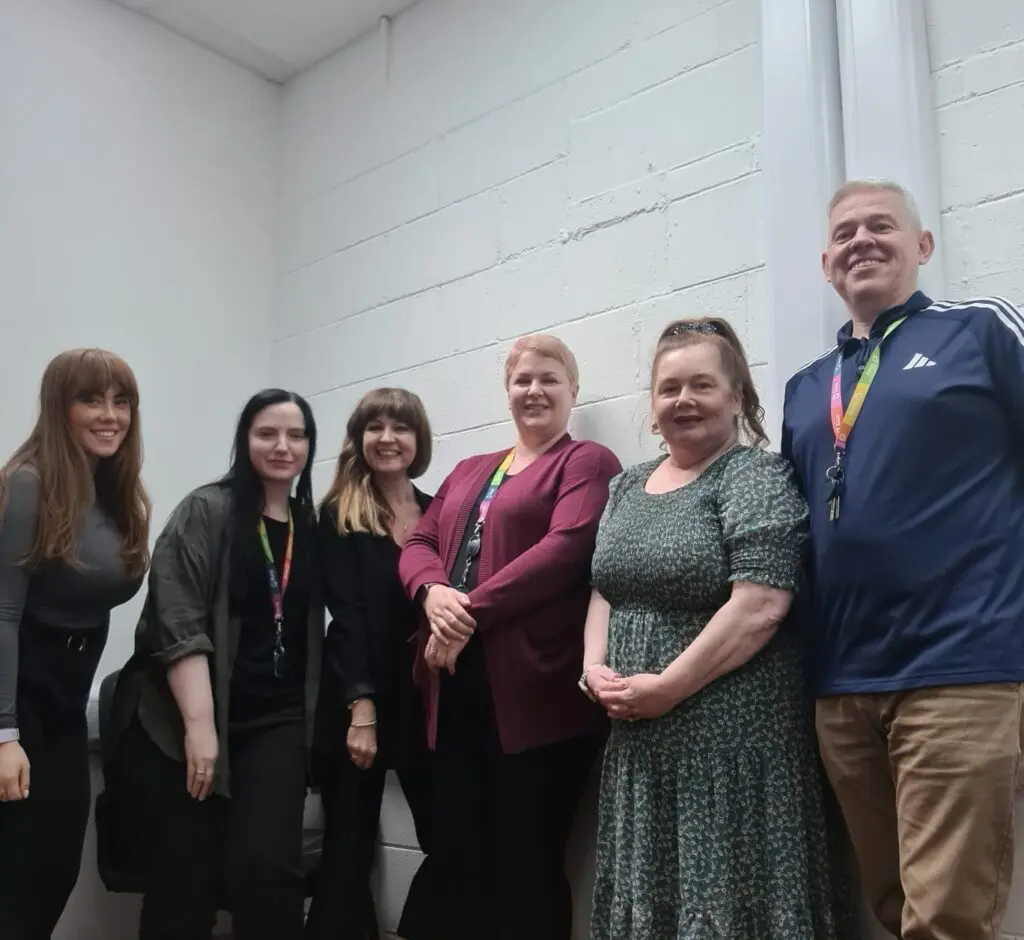
April 2024: Tipperary Education and Training Board
Conor, Karyn and Ruby were in the Anner Hotel in Thurles to deliver a workshop with existing and potential new members of Tipperary ETB Student Council. There were 21 learners in attendance from a broad range of courses. The session was focused on the development of the new online Student Hub for Tipperary ETB. The ETB wants to hear directly from their students about what this new Hub should look like, and what information they would like to see included.
Focus of the session:
- What makes a good website?
- What information should the new Tipperary ETB website have for students?
- Student feedback on the suggested structure
- Is there anything missing?
The students had some brilliant ideas about what should be included in the Hub including a useful section called What are you entitled to? This would have information on grants, scholarships and financial supports available to students, as well as information about accommodation. They also would like to personalise the Student Council section to feature the profiles of the current group. Another suggestion was to add a section on Student Stories in both written and video formats. The group felt it was important that this section showcased a diversity of voices, ages and backgrounds so that all types students were represented.
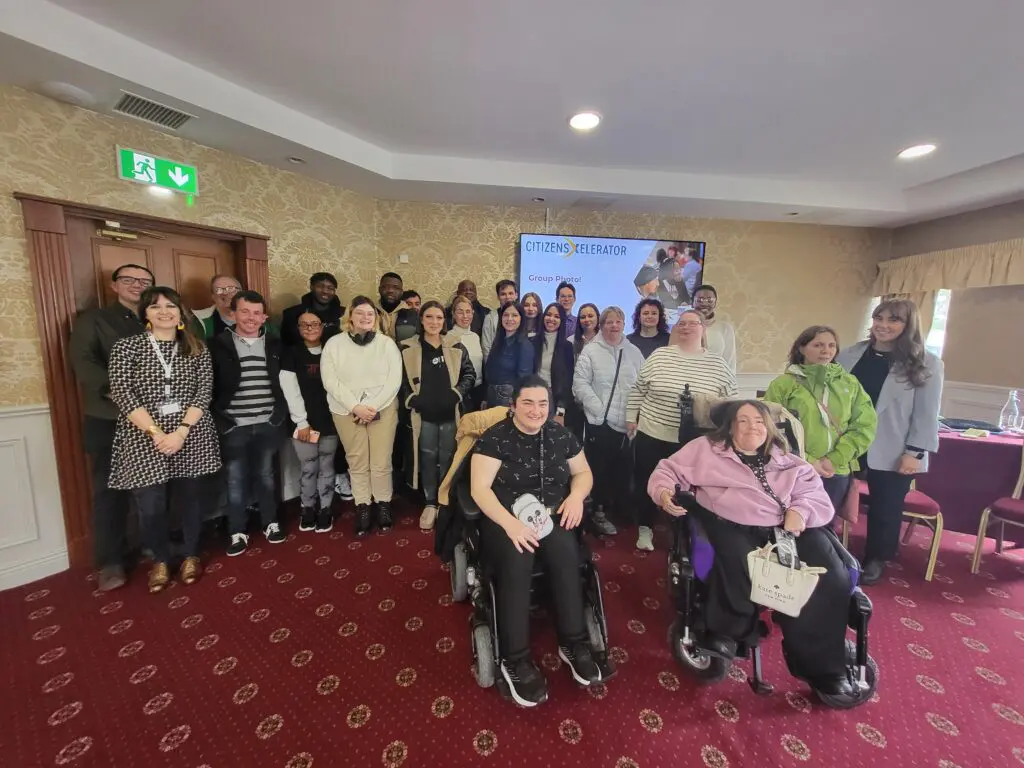
January 2024 with Waterford and Wexford Education and Training Board
Conor and Karyn were in The Tower Hotel in Waterford to deliver training with existing and potential new members of WWETB Learner Council. There were 15 learners in attendance from a broad range of courses.
Focus:
The first part of the session focused on understanding advocacy and representation, and how both are key ingredients of the WWETB Learner Council. The InTuition learners from Enniscorthy had brilliant examples to share from their experience of taking part in an Advocacy Programme with WWETB.
The second part focussed on identifying areas working well and areas for improvement from the WWETB Forum Report from 2023. The participants discussed these areas and came up with innovative ways the Council could work with ETB staff on making progress and came up with possible solutions. Here are some of the topics discussed:
Work Experience:
Learners who are new to the area, or moved to Ireland recently, might struggle more to find a placement. They would like to have access to a list of companies from the previous year’s course to help find a work experience placement. Some learners felt that they need more financial support, particularly for courses that require blocks of work experience.
Communications:
Some learners would like to be informed of services like mental health support or ETB events directly by email. These learners were happy to hear about WWETB’s plans to develop an app for learners to share this type of information.
Transport:
Local Link was discussed as a potential solution for learners living in rural areas.
ESOL:
Some ESOL learners said that they would like to attend more conversational style classes. ETB staff mentioned that these classes are often run in libraries and community centres, and could be sign posted to ESOL learners who aren’t aware of them currently.
As a direct result of this session, one of the learners in attendance, Sultan Ahmed, was invited to speak about his lived experience at the AONTAS Policy Day on the 4th of March at the Richmond Centre in Dublin. The focus of this event was on policy solutions to financial challenges faced by FET learners.
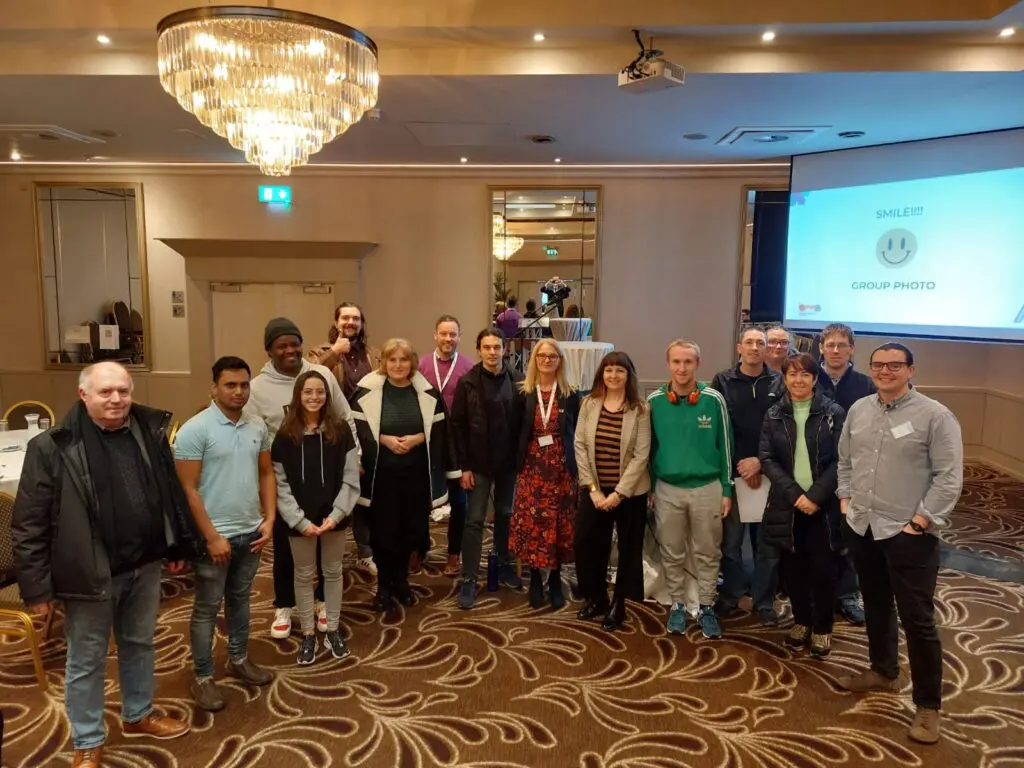
January 2024 with Laois and Offaly Education and Training Board
Conor and Karyn were in Portlaoise to offer training with Student Ambassadors from Laois and Offaly Education and Training Board (LOETB).
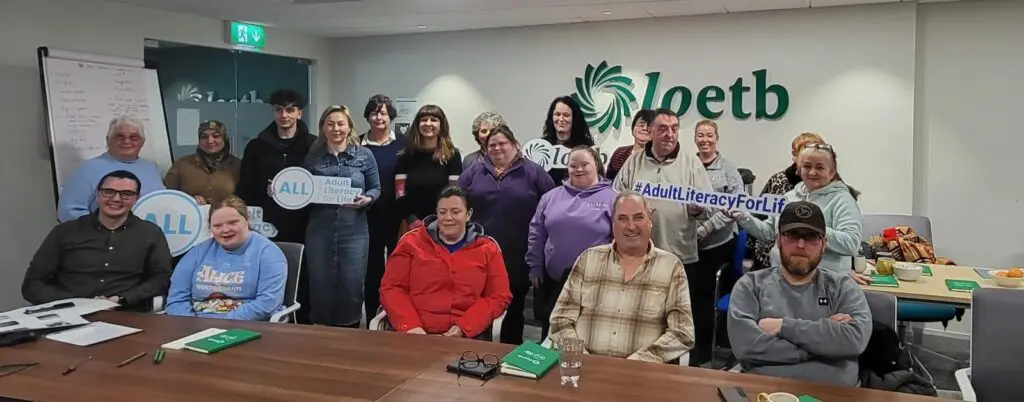
The training was called “Your Story, Your Voice”. It offered a supportive and respectful environment for people to practise telling their stories. They will next be invited to share their stories with a wider audience to encourage more adults to get involved in learning with LOETB.
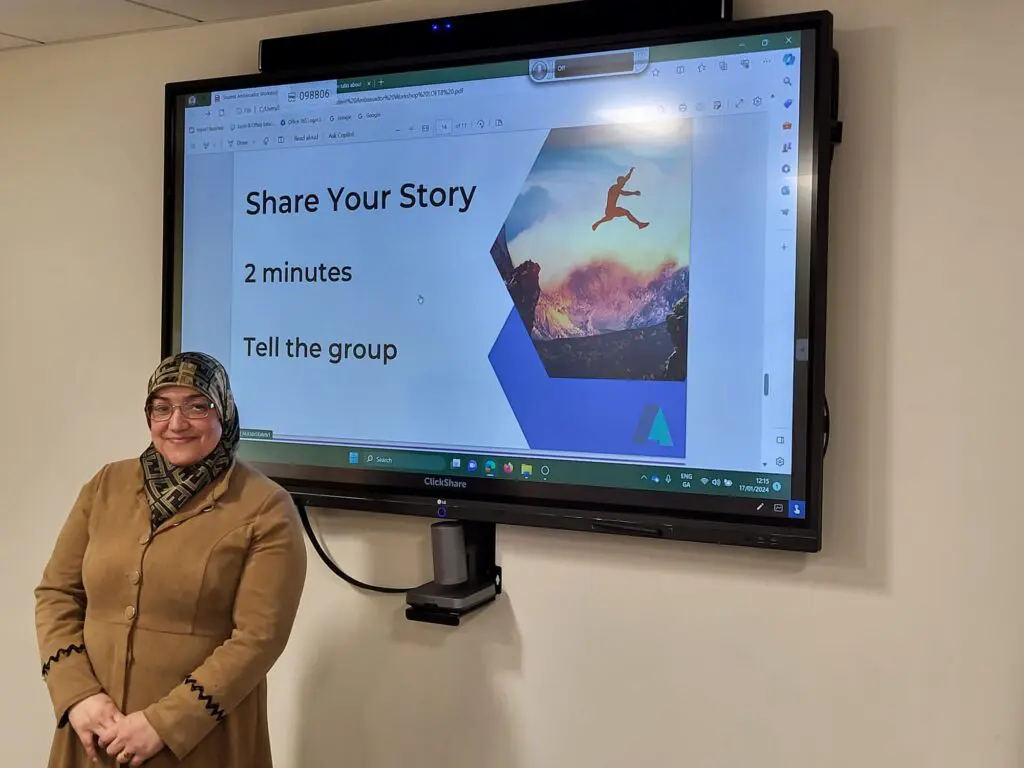
September 2023 with Tipperary Education and Training Board
Conor and Karyn headed to Clonmel to give an advocacy and planning workshop to students with the theme “Making Changes”.
22 people joined for the workshop, which looked at identifying two key issues to work on in 2023 and 2024, to make adult learning better and more accessible.
The students – they prefer to be called students rather than learners – identified the issues of Lack of Transport for attending their course or training, and lack of access to Work Experience relevant to their course or training.
Working in small groups, participants decided what changes they want to see happen in relation to these two issues.
They identified the primary decision-makers in the county to work with to make these changes happen for students like themselves. They completed practical worksheets on preparing for a meeting with decision-makers, and they agreed on a series of next steps to make these changes happen.
Identified Asks:
Transport:
- Provision of a dedicated linked bus service for students across the county to get students to college on time
- An updated bus timetable with buses running every 30 minutes
- Specialised training to be provided for bus drivers on wheelchair-accessible buses
Work Experience:
- All ETB students to have access to work experience. Approach companies to give students same access to work experience as 2nd and 3rd level students
The participants then identified the primary decision-makers in the county to work with to make these changes happen for students like themselves. They completed practical worksheets on preparing for a meeting with decision-makers, and they agreed on a series of next steps to make these changes happen.
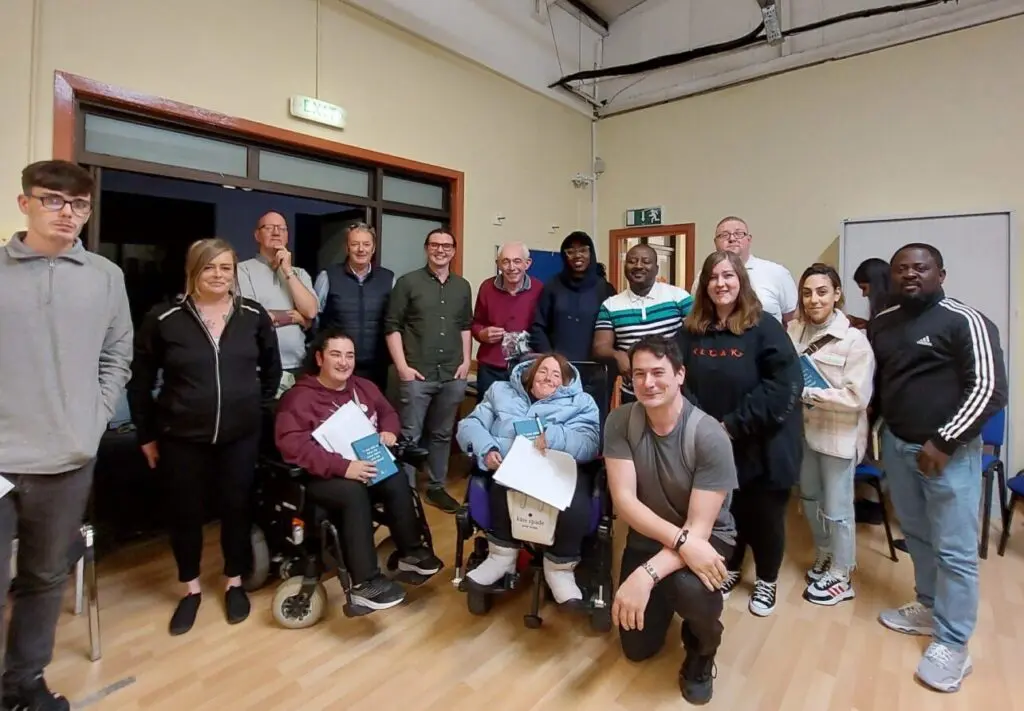
The students working on Transport identified local politicians and councilors, the County Council, the Ministers for Education and for Transport, Local Link representatives and Transport for Ireland.
The students working on Work Experience identified the Senior Management Team of Tipperary ETB, the Chamber of Commerce and local businesses.
They all agreed that they need more specific evidence to support their asks. They want to do research with students across the county to capture their experiences of both issues. They have decided to produce a survey for circulation to all FET students in the county. They will be supported in this by the Community Education Facilitator for Wellbeing in Tipperary ETB. They will set up meetings with their identified decision-makers when the research is complete and they have gathered sufficient evidence. Watch this space for more.
Before the Training:
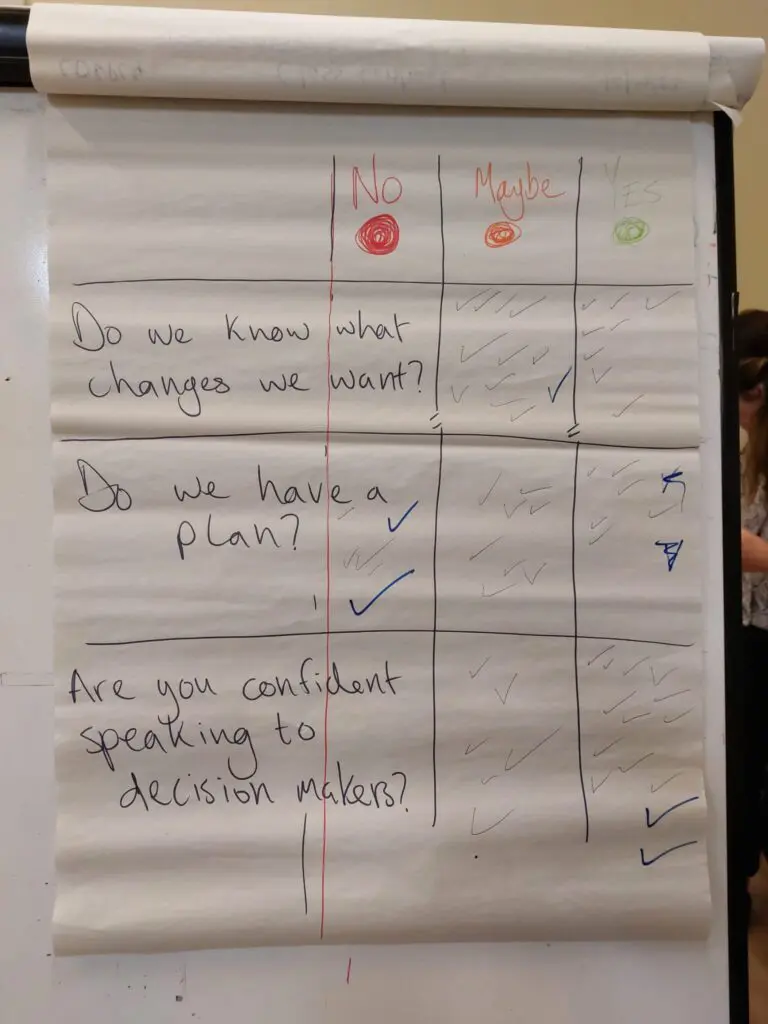
After the Training:
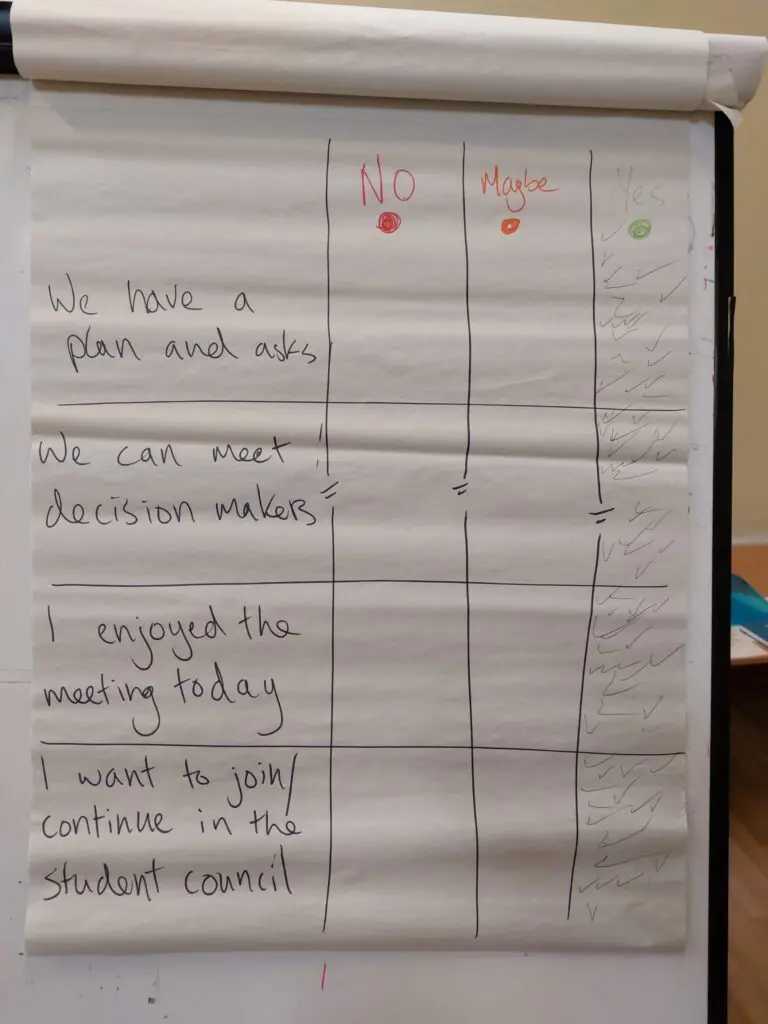
September 2023 with Kilkenny and Carlow Education and Training Board
Conor and Karyn headed to Kilkenny in September to offer a Learner Voice workshop with adult learners with Kilkenny and Carlow Education and Training Board. Learners took part in this training to support them to become Learner Champions in their ETB. The learners shared their stories and experiences to encourage other people to take up adult education classes in their area.
The training focused literacy, and on helping people understand why it’s important to share personal stories and encourage other people to take up classes or courses for reading and writing. The training looked at how learners can identify their own strengths and gain confidence in sharing their own stories.
We were delighted to have 30 learners join us for this session. Four of them were brave enough to stand up in the front of the group and share their stories of doing adult education courses in their local areas.
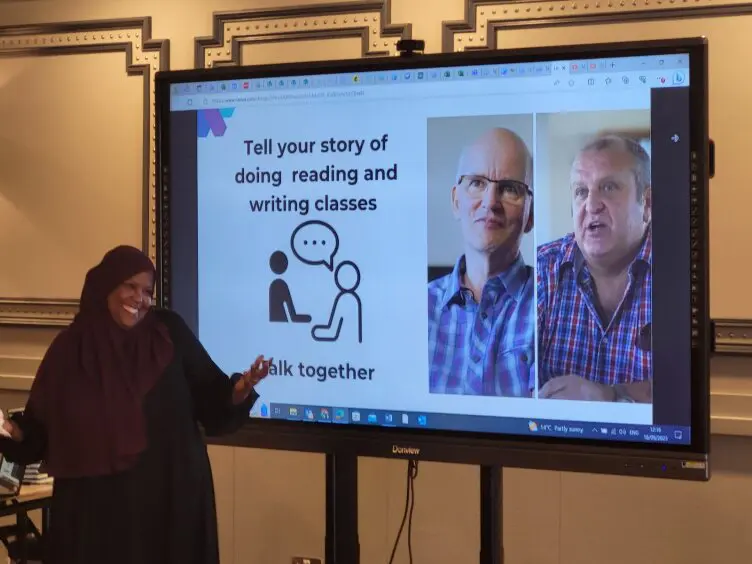
At the end of the session, learners spoke about the independence they had gained from doing reading and writing courses:
“I can go to the GP and shopping by myself now … I feel more confident … When I arrived in Ireland, I couldn’t even say ‘hi’ now I speak to everyone and do things for myself.”
The feedback from learners was very positive. When asked how they felt after the workshop, the participants said, especially after speaking in front of the group, “I am feeling brave now”, and described the work as “interesting”, “motivational”, and “communicative”, and shared that the day had made them feel “happy”.
The development of resources and delivery of this workshop was funded by the European Union’s Erasmus+ programme, and is part of the Basis Education for Empowerment and Participation (BEEP) KA2 project. BEEP works with adults on democratic participation outside of electoral political processes.
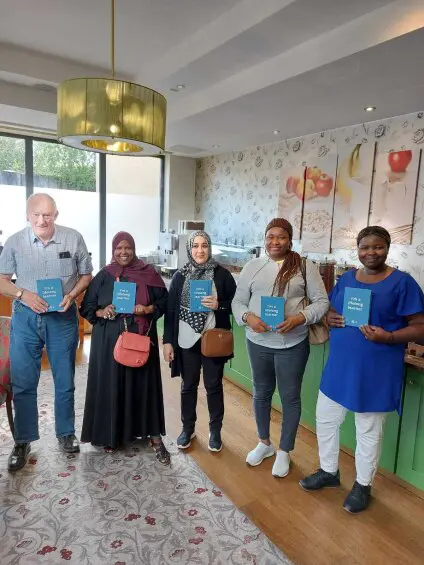
June 2023 with City of Dublin ETB in Finglas
In June, Conor and Karyn headed to Finglas to offer this training to ETB staff. As part of the training, the group used DIXIT cards, asking participants to pick the cards that represent a positive and empowering adult education system and then discuss why.
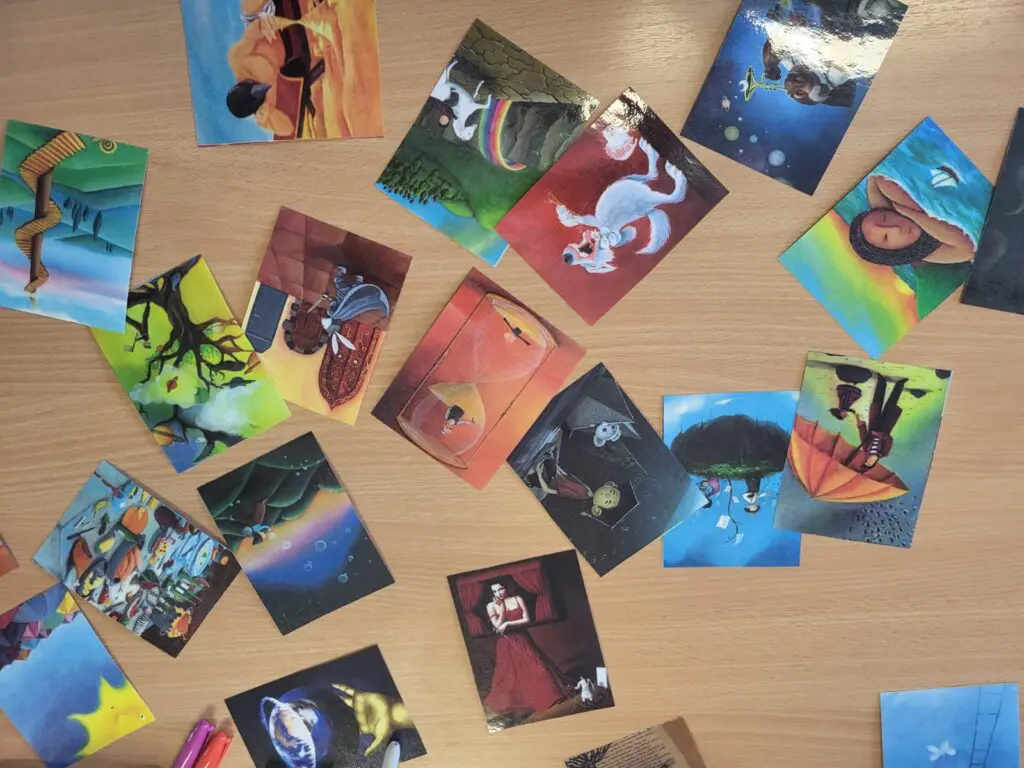
The group picked symbols that they felt represented the learners they work with and their experience in the Cabra and Finglas centres of City of Dublin ETB.
They talked about how returning to education is “not just about certification – it’s about participation in something meaningful”. They said that many learners “feel hope. Seas may still be choppy and the landscape of their everyday lives may not have changed but now [with returning to education] there is a sense of hope”. They also talked about the Adult Education service as “guiding people on their path”, and about the ETB as a place to “shelter from the storm” and “a sense of connection with this centre and with other learners”.
We are grateful to all ETB staff who get involved in working to make the experiences of learners a core part of their approaches.
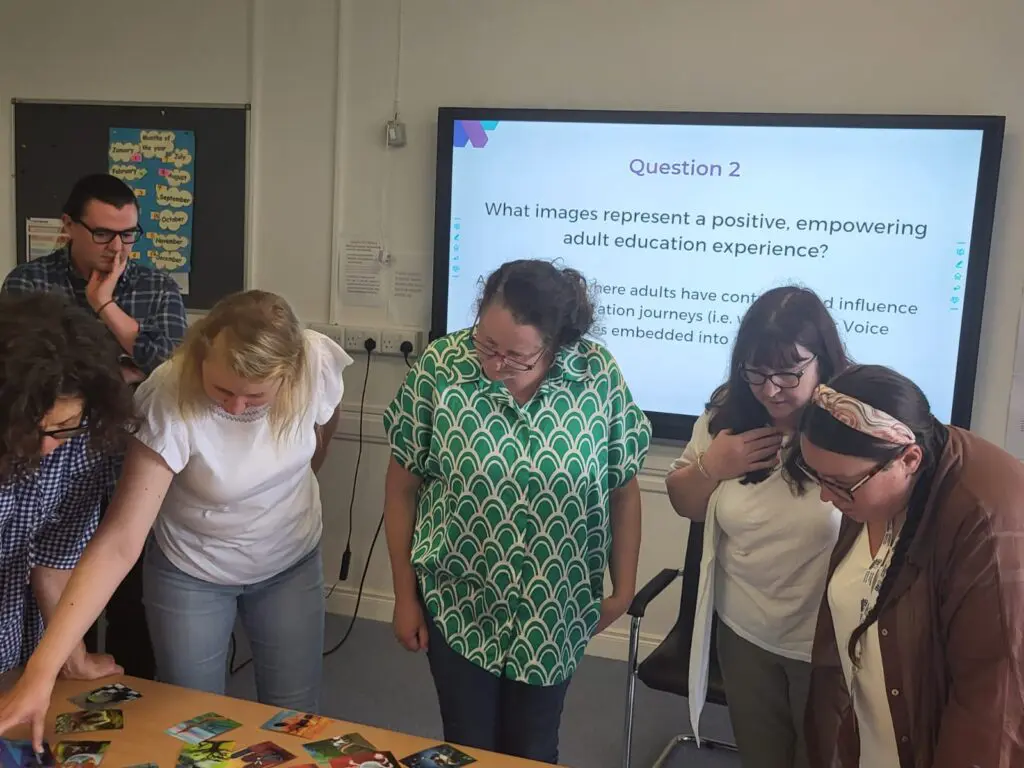
March 2023 with The Tipperary Student Council
Tipperary ETB is seeking to create positive change for adult learners and improve experiences and outcomes. In March 2023, we offered a training workshop to the members of the Tipperary Student Council on understanding advocacy, identifying issues and solutions, and planning an advocacy campaign. Participants all wanted to make change happen, but sought help identifying the issues to focus on. The training workshop got people talking, planning, laughing, and working towards a clear message, while identifying the decision-makers who need to hear their message.
One participant said that, as a result of the training, “I feel like I can do something about what we care about.”
April 2023 with Cork ETB
There fantastic Cork ETB Learner Voices Group is already up and running, and we went there in April to offer training. This group’s members are all adult learners in Further Education and Training. They are a very diverse group of mixed nationalities and ages. What they have in common is that they have all experienced some degree of educational exclusion, and they are seeking to make things better for all learners in Cork ETB. According to their website, they “work on the Lundy Model of Participation, where we provide a safe space for learners to find their voice and express their views. It is also about ensuring that these voices are listened to and responded to in your Centre or Campus and by Cork ETB.”
As part of the AONTAS training, we offered guidance on how to better understand ETB structures, how to make change happen within these structures, and how to plan for next steps. The key to this session was connecting with the participants’ own experiences and previous knowledge.
To provide the best experience possible for the people doing the training, we make it 85% experiential and 15% new information.
We are also developing a handbook and have created some guidance videos for ETBs on how to aid the establishment of Learner Voice groups or councils. We’re doing this with support from Cork ETB, and are developing plans and ideas on how to embed learner capacity-building projects in FET.
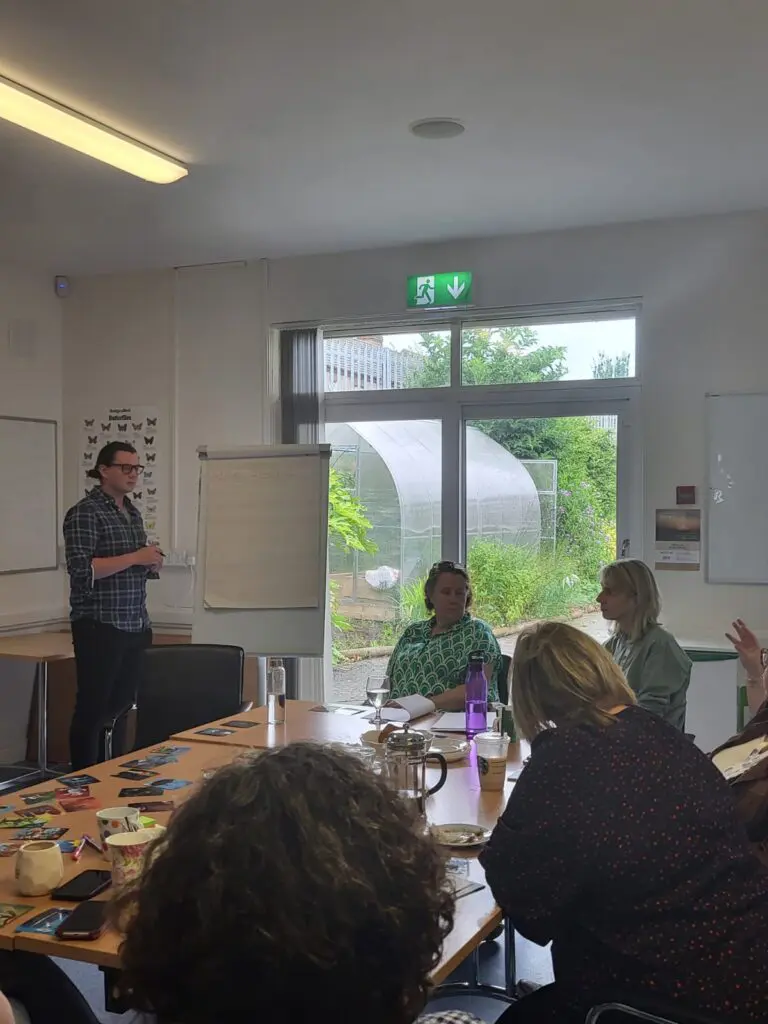
Background
In 2020 and 2021, Education and Training Boards across Ireland were going through a quality assurance review with Quality and Qualifications Ireland (QQI). Given that AONTAS have expertise in the area of Learner Voice, and given our history of research and learner engagement through the National FET Learner Forum, we were asked by ETBs to hold online training sessions with adult learners to prepare them to take part in quality assurance reviews with QQI.
In 2022, we began to develop this work, focusing on supporting people to gain more confidence and skills in leadership and self-advocacy. We held sessions with learners from six ETBs, with a total of 167 learners taking part. These sessions focused on communicating to people that voicing their experience and sharing feedback on their courses and on interactions with their ETB can be integral to creating positive change, both for their own experience of learning and for those who come after them. This process can help identify important issues and how to address them, fostering a learning environment that has been co-created by the learners and staff.
If learners feel heard and respected, it is more likely that they will stay engaged.
We continue to offer training to ETBs and Learner Voice groups across the country. A central part of this is establishing and maintaining partnerships between AONTAS and ETBs.
If you work for or with an ETB and would like to learn more or get involved, contact Ruby at rcooney@aontas.com
News
The very latest news from the adult and community education sector
Blog
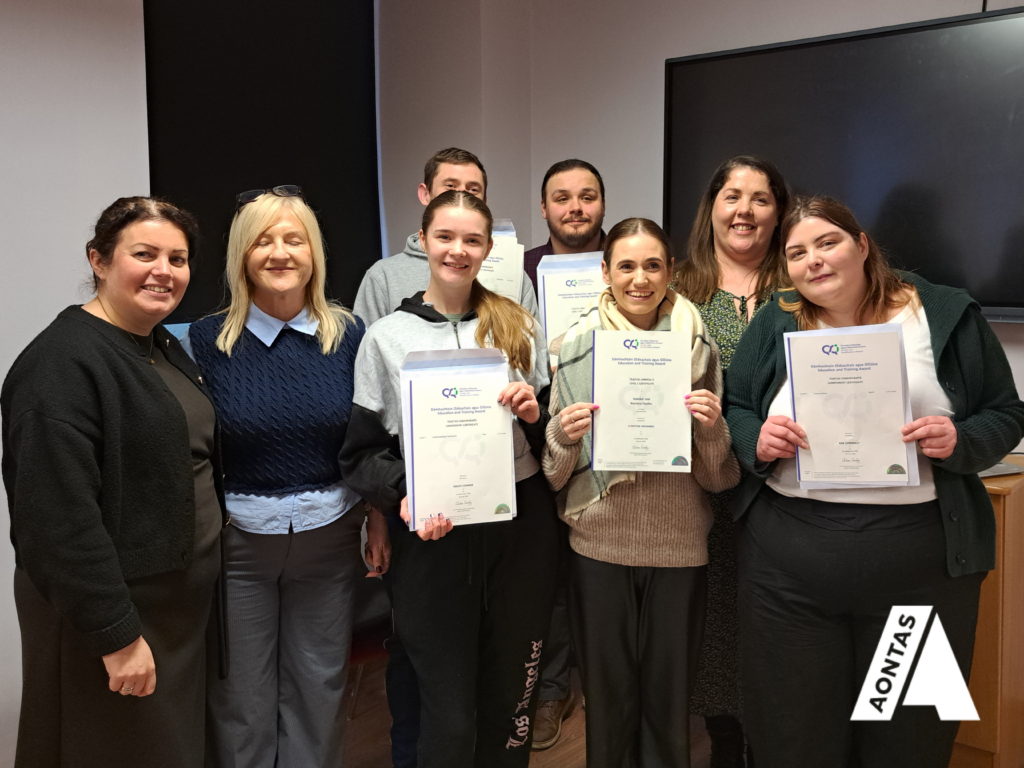
Celebrating Community, Hope, and Achievement with Acorn Youth Work Ireland Midlands, Education and Training Service
12 February 2026
Celebrating Community, Hope, and Achievement with Acorn Youth Work Ireland Midlands, Education and Training Service Written by Lorraine O’Connor Published...
News
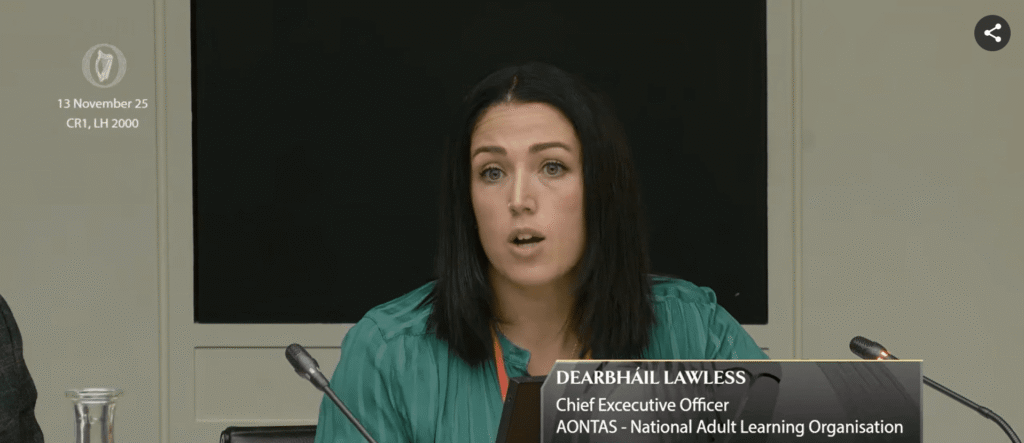
AONTAS Statement on Voluntary and Community Sector Cuts in Northern Ireland
3 February 2026
AONTAS Statement on Voluntary and Community Sector Cuts in Northern Ireland Written by Conor Thompson Published on February 3, 2026...
News
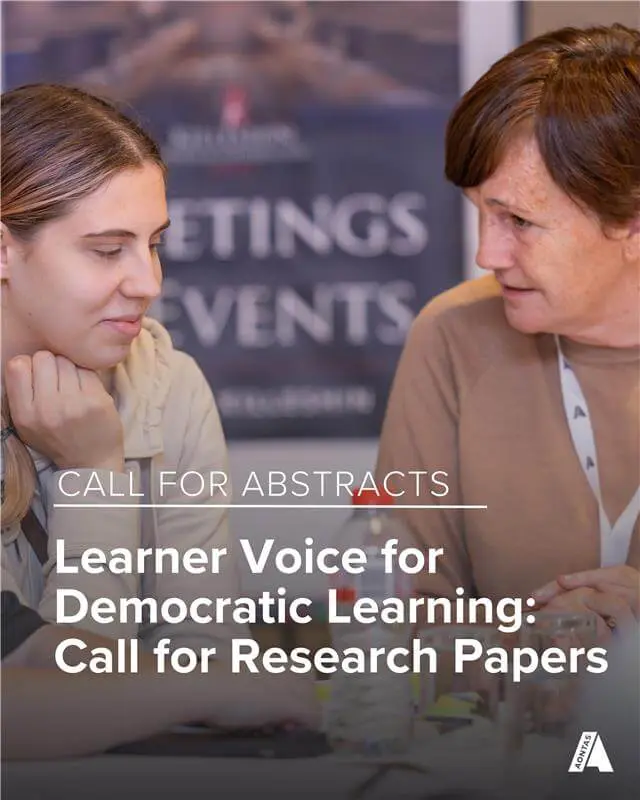
Call for Abstracts | Fourth International Conference of the Scuola Democratica
23 January 2026
News
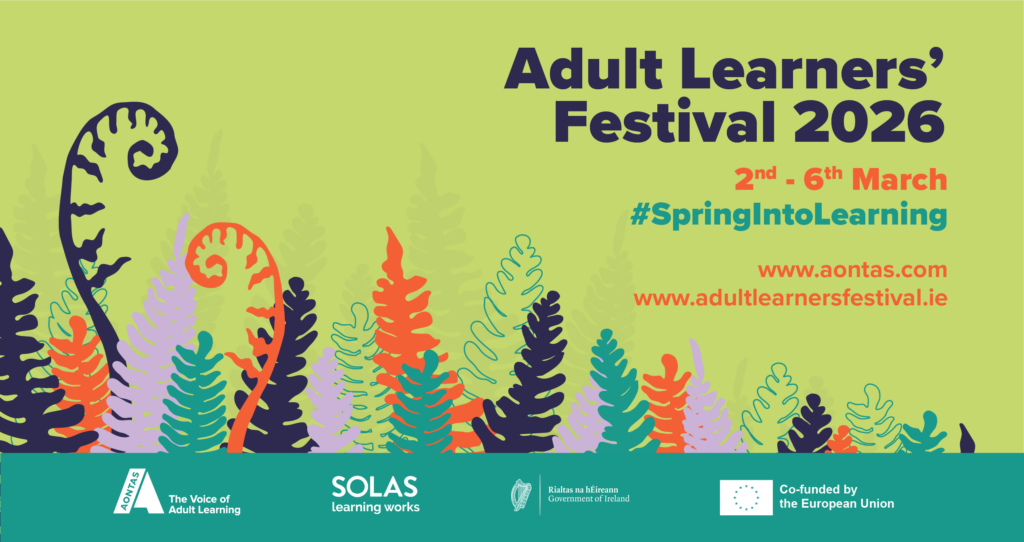
Spring Into Learning with the 2026 AONTAS Adult Learners’ Festival
20 January 2026
Spring Into Learning with the 2026 AONTAS Adult Learners’ Festival Written by Megan Fearon Published on January 20, 2026 Share...
News
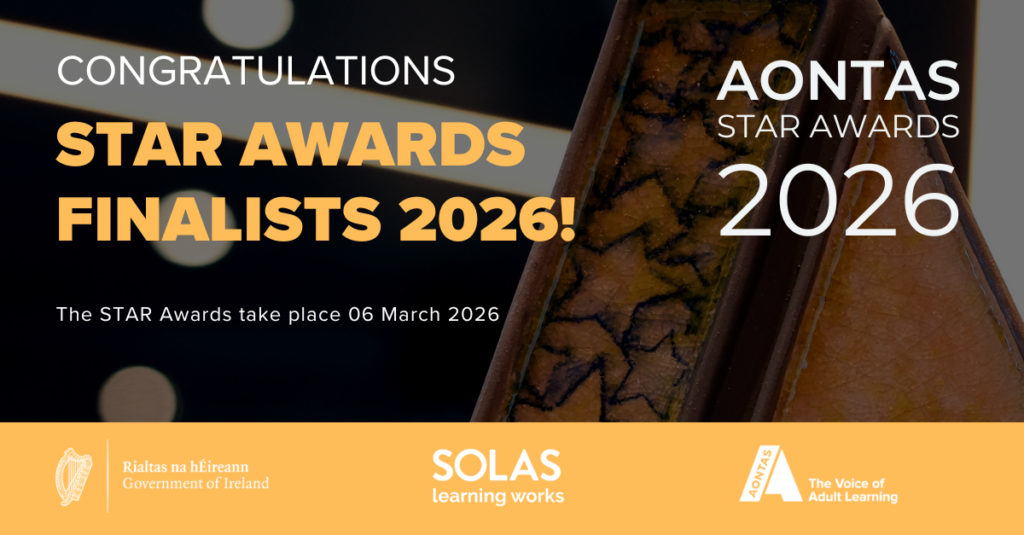
AONTAS Announces 2026 STAR Awards Shortlist!
16 January 2026
News
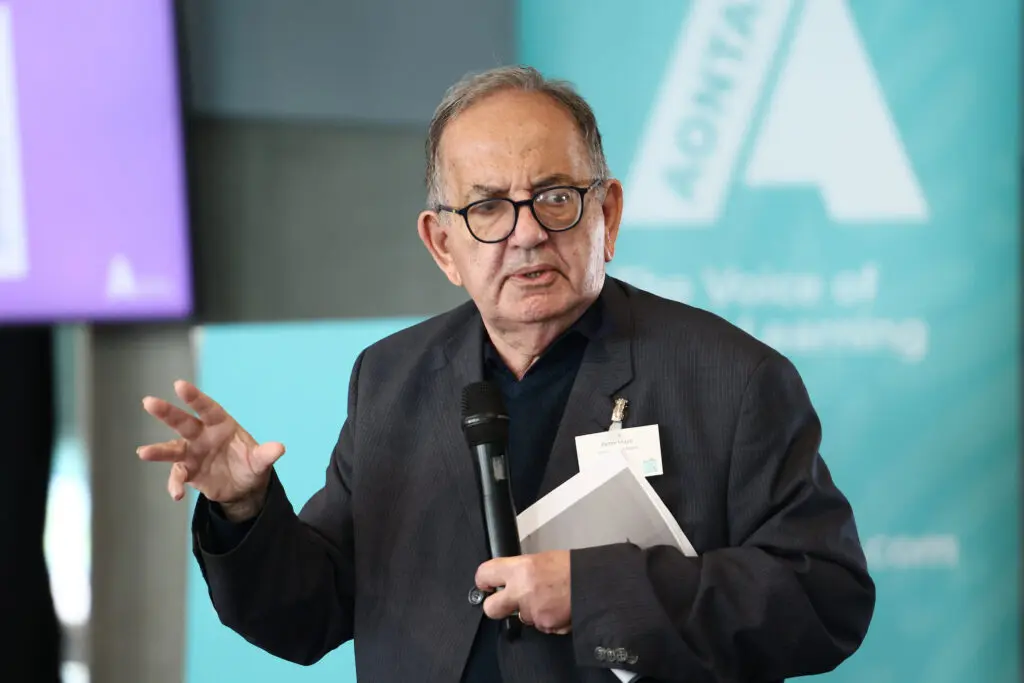
AONTAS Featured in International Adult Education Journal
22 December 2025
AONTAS Featured in International Adult Education Journal Written by Megan Fearon Published on December 22, 2025 Share This AONTAS are...